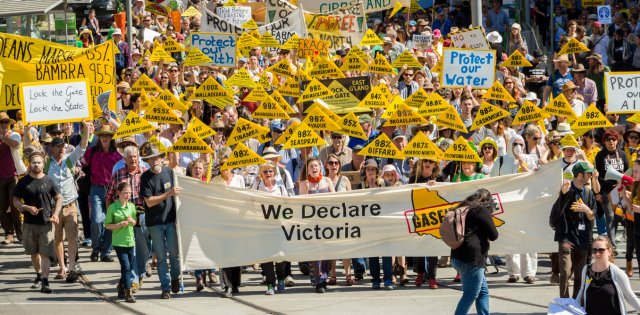
On March 7, Victoria became the first state in Australia to permanently ban hydraulic fracturing (“fracking”), the dangerous process used to mine unconventional gas. This important victory sets the stage for other states to follow.
The Victorian government has also decided to extend the moratorium on onshore conventional gas drilling until June 30, 2020.
“This is an incredible win for the communities in regional Victoria who fought for more than five years to gain this ban and their allies in Melbourne,” Friends of the Earth (FOE) spokesperson Cam Walker told Green Left Weekly.
FOE and Lock the Gate Alliance had been working with rural communities across Victoria for five years. The lower house passed the bill but the Liberal Party, in cahoots with the Shooters, Fishers and Farmers, tried in the upper house to overturn the moratorium and amend the bill to say that gas extracted in Victoria could only be sold to Victorians.
Farmers and others organised a last-minute lobby of MPs to tell them not to support the pro-mining amendments. The Resources Legislation Amendment (Fracking Ban) Bill 2016 was finally passed. It also retrospectively protects the state from being taken to court over the ban and moratorium, and empowers the minister to purchase licences and permits affected by the ban.
The new law flows from the information collected by the government’s 2015 Parliamentary Inquiry into Onshore Unconventional Gas in Victoria, which received more than 1600 submissions. Most opposed onshore unconventional gas mining because of the potential contamination danger to water resources and agricultural land.
At least 75 Victorian communities have declared themselves “gasfield free”. The Victorian Farmers Federation and the National Party supported the ban on fracking.
“The federal government and the industry group Australian Petroleum Production and Exploration Association has run a high profile campaign against the bill arguing, wrongly, that jobs will disappear as a result of the ban”, said Marie Flood from Stop Coal Seam Gas Sydney.
“They also allege that the ban would lead to steep rises in the cost of gas to domestic consumers. This is despite the fact that most Victorian [liquid natural] gas is offshore and is being exported to lucrative overseas markets.”
Anti-fracking groups across the country are pushing for a ban in all states and territories.
“Communities across NSW have been campaigning for more than five years to get their area and the water catchment protected. We need a similar ban on fracking here”, said Flood.
“We congratulate those Victorian communities and the parties which listened to them. There is no real way of delivering protection to food-growing areas and our precious water supplies in the state without a total ban, as Victoria has done. Hiving off different areas, such as around Sydney’s water catchment, is not sufficient.”
The NSW Greens support a ban on fracking, but NSW Labor only supports a ban on fracking in particular regions of the state.
Santos is currently trying to push on with its contested Narrabri gas project in the Pilliga and AGL is continuing to frack for gas in Camden, south west of Sydney.
In the Northern Territory where the anti-fracking campaign pushed NT Labor to promise a moratorium and launch an inquiry, 250 people took part in a meeting on March 7 on the future of shale gas fracking.
Lock the Gate Alliance said that “99% of the people in the room voted in support of a ban on fracking, as hundreds of hands shot up in response to the question put by one participant. Only a couple of known representatives of the gas industry kept their hands by their sides.”
Like the article? Subscribe to Green Left now! You can also like us on Facebook and follow us on Twitter.